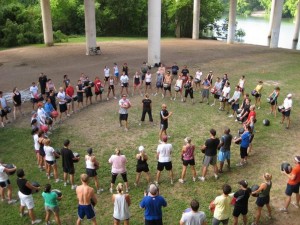 For context read these posts first:
For context read these posts first:
My Health Club
The Problem With Many Churches
CrossFit is Personal
What’s missing in many churches is the kind of personalized training and attention that athletes in a CrossFit box receive. Church leaders must find ways to transition members from private, anonymous attendance to the pursuit of personal goals in a communal setting. This requires more than encouraging everyone to join a small group, something most churches already do. While it’s fashionable to say that life change happens in small groups, it’s more accurate to say that life change happens in small groups that facilitate life-changing experiences.
Getting people out of the pews and into small groups may help members get to know each other. It may provide the communal element that is essential to the equation, but it’s not enough. What we need is for each person to have a personal growth plan built upon their strengths, weaknesses, and basic personality type.
I’ve written before about the importance of measuring our progress as disciples. This requires identifying growth opportunities unique to each individual. Every Christ-follower would benefit from having a personal growth plan that includes a strategy for closing the gap between their strengths and weaknesses.
Most CrossFit athletes are usually pursuing some kind of milestone. It can be losing a certain amount of weight, doing an unassisted pull-up, running a 6 minute mile, or squatting 350 pounds. These milestones vary with the strengths, weaknesses, and aspirations of each athlete.
How cool would it be if every Christians could tell you what their next milestone is for growing as a disciple of Christ?
Right now I’m working on memorizing the Sermon on the Mount. I’d like to stand up and quote the entire thing to an audience someday. To get it done, I’ve got to work on it a little bit every day. Someone else might be working on reading through the entire Bible for the first time (Good luck with Leviticus). Someone else might be working on eliminating angry outbursts while driving. Someone else might be trying to eliminate the bad habit of dwelling on negative thoughts during the day.
These milestones are concrete and measurable. Every follower of Christ could easily develop a short list of these kind of goals to give their spiritual training focus and motivation.
To develop a culture of personalized spiritual training, churches will have to identify, train, and empower cadres of personal spiritual coaches who can help each member set meaningful goals and motivate them toward their milestones. This is where the small group structure could be employed. Every group would have a “trainer” whose job is to help each member of the group develop their personal growth plans. Rather than the purpose of each group being to help church members develop as sense community, the purpose of the group would be to gather disciples for the purpose of spiritual training.
Just as it is with fitness classes, community will develop as a bi-product of the shared pursuit of a goal.
Even though each member of the group is moving at a different pace, working with different strengths and weaknesses, and pursuing different personal goals, everyone is still moving in the same direction and pursuing the same overall goal: becoming more like Christ so that they can be ready for anything.




This is exactly why so many people are finding help/salvation in AA, et. al….and not the church – it is specific and measurable. Either you do the 12 steps or you don’t.
Trainer = Sponsor
Yes, and there is a desperation for change (hitting rock bottom) in AA that is hard to find in churches.